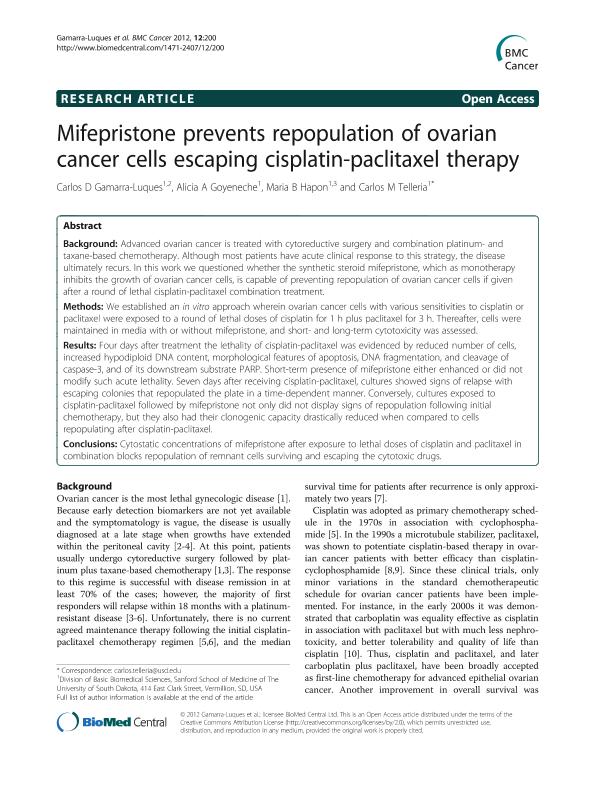Mostrar el registro sencillo del ítem
dc.contributor.author
Gamarra Luques, Carlos Diego

dc.contributor.author
Goyeneche, Alicia A.
dc.contributor.author
Hapon, María Belén

dc.contributor.author
Telleria, Carlos Marcelo

dc.date.available
2019-08-07T20:27:51Z
dc.date.issued
2012-05
dc.identifier.citation
Gamarra Luques, Carlos Diego; Goyeneche, Alicia A.; Hapon, María Belén; Telleria, Carlos Marcelo; Mifepristone prevents repopulation of ovarian cancer cells escaping cisplatin-paclitaxel therapy; BioMed Central; BMC Cancer; 12; 5-2012; 1-16
dc.identifier.issn
1471-2407
dc.identifier.uri
http://hdl.handle.net/11336/81171
dc.description.abstract
Background: Advanced ovarian cancer is treated with cytoreductive surgery and combination platinum- and taxane-based chemotherapy. Although most patients have acute clinical response to this strategy, the disease ultimately recurs. In this work we questioned whether the synthetic steroid mifepristone, which as monotherapy inhibits the growth of ovarian cancer cells, is capable of preventing repopulation of ovarian cancer cells if given after a round of lethal cisplatin-paclitaxel combination treatment.Methods: We established an in vitro approach wherein ovarian cancer cells with various sensitivities to cisplatin or paclitaxel were exposed to a round of lethal doses of cisplatin for 1 h plus paclitaxel for 3 h. Thereafter, cells were maintained in media with or without mifepristone, and short- and long-term cytotoxicity was assessed.Results: Four days after treatment the lethality of cisplatin-paclitaxel was evidenced by reduced number of cells, increased hypodiploid DNA content, morphological features of apoptosis, DNA fragmentation, and cleavage of caspase-3, and of its downstream substrate PARP. Short-term presence of mifepristone either enhanced or did not modify such acute lethality. Seven days after receiving cisplatin-paclitaxel, cultures showed signs of relapse with escaping colonies that repopulated the plate in a time-dependent manner. Conversely, cultures exposed to cisplatin-paclitaxel followed by mifepristone not only did not display signs of repopulation following initial chemotherapy, but they also had their clonogenic capacity drastically reduced when compared to cells repopulating after cisplatin-paclitaxel.Conclusions: Cytostatic concentrations of mifepristone after exposure to lethal doses of cisplatin and paclitaxel in combination blocks repopulation of remnant cells surviving and escaping the cytotoxic drugs.
dc.format
application/pdf
dc.language.iso
eng
dc.publisher
BioMed Central

dc.rights
info:eu-repo/semantics/openAccess
dc.rights.uri
https://creativecommons.org/licenses/by-nc-sa/2.5/ar/
dc.subject
Mifepristone
dc.subject
Cancer de Ovario
dc.subject
Apoptosis
dc.subject
Ciclo Celular
dc.subject.classification
Inmunología

dc.subject.classification
Medicina Básica

dc.subject.classification
CIENCIAS MÉDICAS Y DE LA SALUD

dc.title
Mifepristone prevents repopulation of ovarian cancer cells escaping cisplatin-paclitaxel therapy
dc.type
info:eu-repo/semantics/article
dc.type
info:ar-repo/semantics/artículo
dc.type
info:eu-repo/semantics/publishedVersion
dc.date.updated
2019-06-10T21:20:37Z
dc.journal.volume
12
dc.journal.pagination
1-16
dc.journal.pais
Reino Unido

dc.journal.ciudad
Londres
dc.description.fil
Fil: Gamarra Luques, Carlos Diego. Consejo Nacional de Investigaciones Científicas y Técnicas. Centro Científico Tecnológico Conicet - Mendoza. Instituto de Histología y Embriología de Mendoza Dr. Mario H. Burgos. Universidad Nacional de Cuyo. Facultad de Ciencias Médicas. Instituto de Histología y Embriología de Mendoza Dr. Mario H. Burgos; Argentina. University Of South Dakota. Sanford School Of Medicine; Estados Unidos
dc.description.fil
Fil: Goyeneche, Alicia A.. University Of South Dakota. Sanford School Of Medicine; Estados Unidos
dc.description.fil
Fil: Hapon, María Belén. University Of South Dakota. Sanford School Of Medicine; Estados Unidos. Consejo Nacional de Investigaciones Científicas y Técnicas. Centro Científico Tecnológico Conicet - Mendoza. Instituto de Medicina y Biología Experimental de Cuyo; Argentina
dc.description.fil
Fil: Telleria, Carlos Marcelo. University Of South Dakota. Sanford School Of Medicine; Estados Unidos. Consejo Nacional de Investigaciones Científicas y Técnicas; Argentina
dc.journal.title
BMC Cancer

dc.relation.alternativeid
info:eu-repo/semantics/altIdentifier/url/https://bmccancer.biomedcentral.com/articles/10.1186/1471-2407-12-200
dc.relation.alternativeid
info:eu-repo/semantics/altIdentifier/doi/http://dx.doi.org/10.1186/1471-2407-12-200
Archivos asociados
